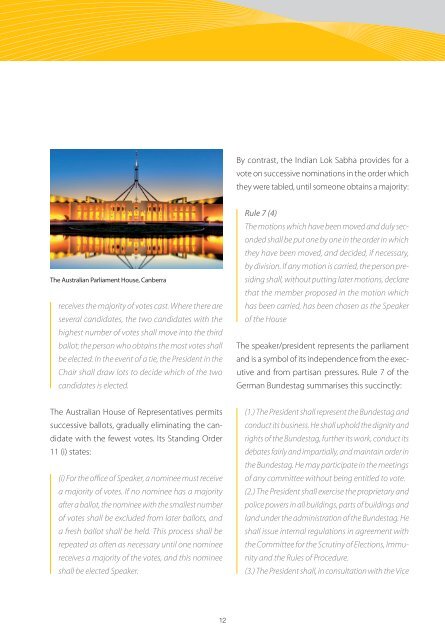Parliamentary Rules of Procedure - European Parliament - Europa
Parliamentary Rules of Procedure - European Parliament - Europa
Parliamentary Rules of Procedure - European Parliament - Europa
Create successful ePaper yourself
Turn your PDF publications into a flip-book with our unique Google optimized e-Paper software.
the Australian <strong>Parliament</strong> House, Canberra<br />
receives the majority <strong>of</strong> votes cast. Where there are<br />
several candidates, the two candidates with the<br />
highest number <strong>of</strong> votes shall move into the third<br />
ballot; the person who obtains the most votes shall<br />
be elected. In the event <strong>of</strong> a tie, the President in the<br />
Chair shall draw lots to decide which <strong>of</strong> the two<br />
candidates is elected.<br />
The australian House <strong>of</strong> Representatives permits<br />
successive ballots, gradually eliminating the can-<br />
didate with the fewest votes. its standing Order<br />
11 (i) states:<br />
(i) For the <strong>of</strong>fice <strong>of</strong> Speaker, a nominee must receive<br />
a majority <strong>of</strong> votes. If no nominee has a majority<br />
after a ballot, the nominee with the smallest number<br />
<strong>of</strong> votes shall be excluded from later ballots, and<br />
a fresh ballot shall be held. This process shall be<br />
repeated as <strong>of</strong>ten as necessary until one nominee<br />
receives a majority <strong>of</strong> the votes, and this nominee<br />
shall be elected Speaker.<br />
12<br />
By contrast, the indian Lok sabha provides for a<br />
vote on successive nominations in the order which<br />
they were tabled, until someone obtains a majority:<br />
Rule 7 (4)<br />
The motions which have been moved and duly seconded<br />
shall be put one by one in the order in which<br />
they have been moved, and decided, if necessary,<br />
by division. If any motion is carried, the person presiding<br />
shall, without putting later motions, declare<br />
that the member proposed in the motion which<br />
has been carried, has been chosen as the Speaker<br />
<strong>of</strong> the House<br />
The speaker/president represents the parliament<br />
and is a symbol <strong>of</strong> its independence from the executive<br />
and from partisan pressures. Rule 7 <strong>of</strong> the<br />
German Bundestag summarises this succinctly:<br />
(1.) The President shall represent the Bundestag and<br />
conduct its business. He shall uphold the dignity and<br />
rights <strong>of</strong> the Bundestag, further its work, conduct its<br />
debates fairly and impartially, and maintain order in<br />
the Bundestag. He may participate in the meetings<br />
<strong>of</strong> any committee without being entitled to vote.<br />
(2.) The President shall exercise the proprietary and<br />
police powers in all buildings, parts <strong>of</strong> buildings and<br />
land under the administration <strong>of</strong> the Bundestag. He<br />
shall issue internal regulations in agreement with<br />
the Committee for the Scrutiny <strong>of</strong> Elections, Immunity<br />
and the <strong>Rules</strong> <strong>of</strong> <strong>Procedure</strong>.<br />
(3.) The President shall, in consultation with the Vice

















